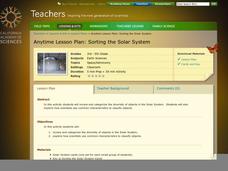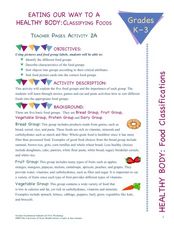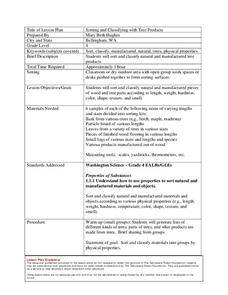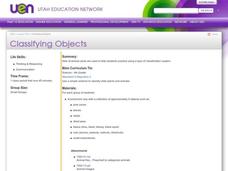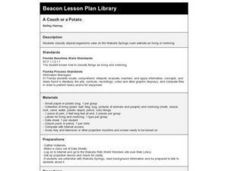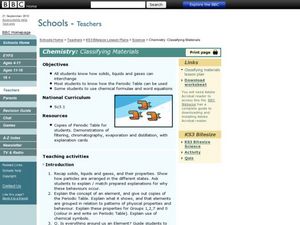American Chemical Society
Classifying Objects Based on their Observable Properties
Sorting objects by properties is a lesson in justification. Learners begin by studying different types of properties of materials, including those based on appearance and texture. They examine the properties of specific items and use...
Curated OER
Classifying Objects
Fourth graders classify living things according to similarities and differences through guided and independent activities. They place objects into groups according to their characteristics and then make a collage of living things...
Curated OER
What Is Natural?
Your junior highers will learn about which objects are natural and classify objects as abiotic or biotic. Your class will trace human products to their natural resources using matter cycles and then create their own definition of nature.
Curated OER
Sorting Living and Nonliving Objects
Third graders sort and classify objects. In this sorting lesson, 3rd graders sort small objects such as cereal or candy. Then, students classify and sort objects that are living or nonliving.
California Academy of Science
Sorting the Solar System
Scientists are always sorting and classifying objects based on their characteristics. In a hands-on learning activity, young space explorers work together to categorize solar system cards based on their properties. It is up to the...
Curated OER
Classify Machines that Fly!
Eighth graders explore flight and the dichotomous key. In this flight lesson, 8th graders gain understanding of the dichotomous key and create one of their own. Students then use their dichotomous key to classify types of aircraft.
Curated OER
Keys and Classifying
Students classify plants and animals. In this organisms instructional activity, students define classification and sort various objects according to its attributes. Students then research wildlife of Utah and group the organisms into...
National Nanotechnology Infrastructure Network
Big vs. Little - Macro to Micro Lesson 5
It is a long way from nano to macro. Learners examined the scale of measurement from macro to nano in the first four lessons of the five-part series. With the final installment, they review what they learned by classifying objects in one...
Curated OER
Classifying Rocks
Fifth graders examine and participate in the process of classifying rocks. In small groups, they sort the rocks into two categories and complete a Venn diagram. Next, they select three rocks, and complete a worksheet that is in the...
Curated OER
Classifying
In this classifying learning exercise, students are given 8 rows of illustrations of animals. Students try out various ways to organize the animals in a classification system following the directions. They try a 2 groups system and a 3-5...
Curated OER
Eating Our Way to a Healthy Body: Classifying Foods
Students examine the major food groups. In this classifying foods lesson, students discover the 5 food groups as they read books and play games. Students then sort foods into the appropriate food groups
Curated OER
Sorting and Classifying with Tree Products
Fourth graders sort and classify wood. In this sorting tree products lesson, 4th graders sort and classify tree parts and pieces of wood, both natural and manufactured according to their properties.
Curated OER
Magnets: Magnetic Pick-Ups
Fourth graders investigate the affect of magnetism on various objects. They determine ways of sorting or classifying objects. Students examine what features of objects determine whether they are attracted to a magnet. They record their...
Curated OER
Classifying Objects
Fourth graders work in small groups to sort and classify a variety of objects. They develop criteria for sorting and explain the characteristics they chose for classification. Groups record and share their classifications.
Curated OER
Living and Nonliving
Learners use their senses to record and collect data. In How Do I Classify Things in My World?, students practice classifying objects as living or nonliving. In Is it Real Or Pretend?, learners group objects as real or pretend. In What...
Curated OER
A Couch or a Potato
Students classify objects and organisms seen on the Wakulla Springs icam website as living or nonliving.
Curated OER
Matter And Materials
Students investigate the concept of identifying different objects in nature and classifying them into different categories. The students will describe and explain a group of the objects orally and in writing form that is appropriate to...
Curated OER
Classification And Identification
Students explore diagrammatic and taxonomic keys and their application in the marine sciences. They sort and classify objects and organisms based on visual attributes.
Curated OER
Look At Those Leaves!
Kids observe, classify, and measure tree leaves with a scientific eye. They examine leaves, group them according their attributes, and use standard units of measurement as they compare their sizes. They access a web site to learn how...
Curated OER
Sorting Things Out
Written to examine seeds that grow in Kansas, you can adapt this lesson to anywhere you live. Learners sort a mixture of five different seeds to by any characteristic of their choice. When your budding scientists are exploring the life...
Curated OER
Sampling Rocks
Here is a geology instructional activity which invites learners to explore a variety of rocks. They find rocks in the schoolyard and classify them according to size, color, and weight, then read the book Everybody Needs a Rock. Good...
Curated OER
Chemistry: Classifying Materials
Middle schoolers classify materials. In this chemistry lesson plan, students examine the properties of solids, liquids, and gases. Middle schoolers discover the elements, compounds, and chemical symbols.
Curated OER
Classifying Candy I
Students explore the observable properties of matter. They develop two binary classification systems using concrete objects. based on two different properties of the concrete objects.
Curated OER
Discovering Dichotomous Keys
Young scholars become familiar with the structure and use of dichotomus keys. They demonstrate a comprehension of the fundamental principles of taxonomy by classifying organisms from a local ecosystem. Students are introduced to the...




